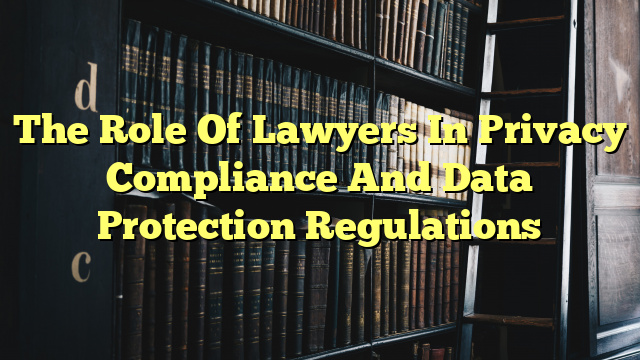Data protection regulations have become increasingly important in today’s world. Organizations and businesses must adhere to the rules in order to ensure the safety and security of their customers’ personal data. Lawyers have an important role to play in helping organizations meet their legal obligations, as well as in helping them understand and develop their own data protection policies. This article will discuss the role of lawyers in privacy compliance and data protection regulations.
The Role of Lawyers
Lawyers are responsible for helping organizations understand their legal obligations in terms of data protection regulations. Lawyers are also responsible for advising organizations on how to develop and implement their own policies so that they meet the requirements of the regulations. Lawyers are also expected to provide advice on how to ensure that the organization remains compliant with the regulations and up to date with any changes or updates.
In addition to providing advice, lawyers are also responsible for providing training and education on data protection regulations. This can include providing guidance on best practices and how to ensure compliance with the regulations. Additionally, lawyers are expected to review the organization’s policies and procedures to ensure that they are compliant. This can include evaluating existing practices and making recommendations to improve them.
Lawyers are also responsible for representing organizations in court, and for representing them in legal proceedings related to data protection. Lawyers are expected to be knowledgeable about the regulations and to provide their clients with sound legal advice. They are also expected to be familiar with the laws and regulations governing data protection in their jurisdiction.
Who Is Responsible for Compliance with Data Protection Regulations?
Organizations are ultimately responsible for ensuring that they comply with all applicable data protection regulations. However, there are various roles within an organization that are responsible for ensuring that the organization is compliant. The primary responsibility lies with the organization’s management and senior leaders. It is also important for organizations to hire lawyers who are knowledgeable about data protection laws and regulations, and who can provide advice and guidance on how to ensure compliance.
Additionally, many organizations have begun to appoint Data Protection Officers (DPOs) to oversee their data protection compliance. A DPO is responsible for overseeing and monitoring the organization’s compliance with data protection regulations. They are also responsible for developing, implementing, and enforcing data protection policies and procedures. DPOs are also responsible for ensuring that the organization is compliant with all applicable regulations and laws.
What Is the Role of a Data Protection Officer?
Data Protection Officers are responsible for ensuring that the organization is compliant with data protection regulations. They are responsible for developing and implementing data protection policies and procedures, as well as monitoring and auditing compliance. The DPO is also required to provide advice and guidance to the organization on data protection issues. Additionally, the DPO is responsible for responding to data protection requests and complaints.
What Are the Legal Responsibilities of GDPR?
The General Data Protection Regulation (GDPR) is the primary data protection regulation in Europe. It is a comprehensive set of rules and regulations that govern how organizations must handle and protect the personal data of their customers. The GDPR is legally binding and organizations must ensure that they comply with all of the requirements.
Organizations are required to ensure that they have adequate technical and organizational measures in place to protect the personal data they collect. Additionally, organizations must ensure that they have data protection policies and procedures in place to ensure compliance with the GDPR. Furthermore, organizations are required to provide their customers with clear information about how their personal data is being used and protected.
Are Data Privacy Principles Required by Law?
Data privacy principles are not required by law, but they are an important part of any data protection program. Data privacy principles are a set of guidelines that organizations must follow when handling and protecting personal data. These principles include the right to be informed, the right to access, the right to object, the right to be forgotten, and the right to data portability.
Organizations must ensure that they are following these principles in order to protect their customers’ personal data. Additionally, organizations should ensure that they are regularly reviewing their data privacy policies and procedures to ensure that they remain compliant with the principles.
Conclusion
Lawyers have an important role to play in helping organizations comply with data protection regulations. They are responsible for providing advice and guidance on data protection policies, as well as providing training and education on the regulations. Additionally, they are responsible for representing organizations in legal proceedings related to data protection

